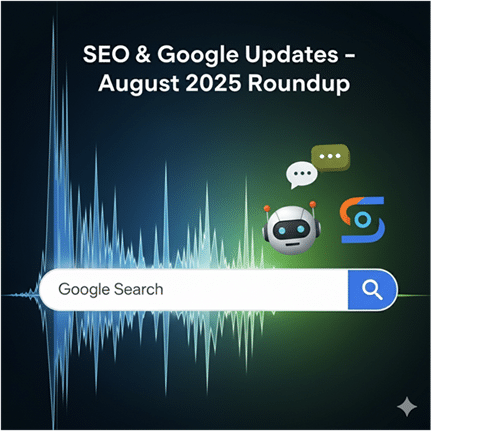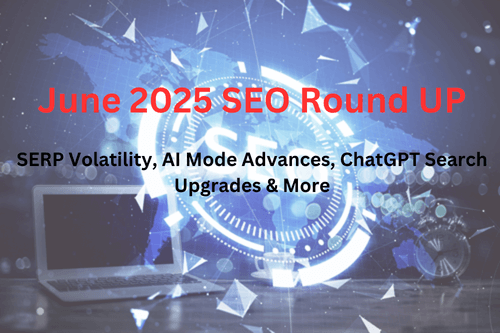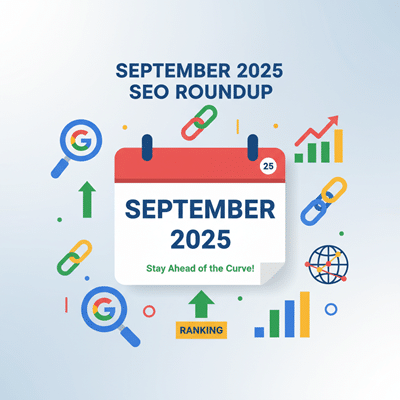August 2025 marked a period of significant upheaval and change in the SEO landscape. Google launched a worldwide Spam Update, broadened AI search experiences to new regions and offerings, and ongoing ranking fluctuations kept websites on edge. In the meantime, advertising platforms advanced with loyalty targeting and exclusions, Bing enhanced its Webmaster Tools, and Google delved further into financial data with an AI-driven Finance interface.

Annotation: This graphic is a visual metaphor for the chaos and opportunity in SEO, blending the data-driven world of volatility with the disruptive power of AI.
For those in the digital landscape, the message is unmistakable: prepare for change, enhance visibility through emerging AI platforms, and track results meticulously.
1. Google’s August 2025 Spam Update — Shaking the Web Again
- Summary: Google started implementing its worldwide spam update on August 26, 2025. It focuses on low-quality content in various languages and will be active for several weeks.
- Why It Matters: Anticipate significant variations, especially regarding lightweight AI content, parasitic SEO tactics, and subpar link networks.
- Pro Tip (SEO Agency Boston): Label dashboards with the date of the latest update. Concentrate on content clusters and various page types rather than assessing individual URLs to measure effectiveness. Hold off on making any sudden changes until the rollout is complete.

Source: https://status.search.google.com/incidents/a7Aainy6E9rZsmfq82xt
2. “Preferred Sources” for Top Stories — Giving Readers More Control
- Summary: Google has rolled out an exciting new feature in the U.S. and India that lets users highlight their preferred publishers in Top Stories. A section titled “From your sources” might now appear in search engine results pages.
- Why It Matters: It subtly enhances the influence of user preferences. Publishers that have a solid connection with their brand are likely to achieve greater visibility.
- Pro Tip: Publishers need to focus on strengthening brand loyalty through newsletters, fostering community connections, and encouraging repeat engagement. Being a trusted option creates a buffer against instability.
Here’s how to select your sources:



Source: https://blog.google/products/search/preferred-sources/
3. AI Mode Expansion — UK Rollout & EU Testing
- Summary: AI Mode made its official debut in the UK on July 28, driven by Gemini 2.5. Facilitates various types of input, including text, voice, and images. In the EU, smaller trials were observed.
- Why It Matters: Users are participating in queries that are 2–3 times longer and enjoying sessions that last 38% longer. This indicates a shift towards more exploratory and conversational search experiences.
- Pro Tip: Enhance your content by incorporating organized Q&A sections, frequently asked questions, tables, visuals, and detailed, context-rich responses. Your content needs to be proactive in addressing potential follow-up questions, rather than solely focusing on ranking for individual keywords.
Source: https://blog.google/around-the-globe/google-europe/united-kingdom/ai-mode-search-uk/
4. Search Console Crawl-Rate Drops — Mystery Signals
- Summary: Reports indicate a significant decline in crawl activity within Search Console during the latter part of August. There hasn’t been an official explanation provided at this time.
- Why It Matters: Lower crawl rates may lead to a lag in the indexing of fresh or revised content.
- Pro Tip: Review the server logs. Make sure that Googlebot is still sending crawl requests. Ensure that your shared hosting isn’t subject to throttling.
Some sites (not all) are seeing massive declines in crawl rates in Google Search Console – not super widespread but wide enough… www.seroundtable.com/google-crawl… via @glenngabe.bsky.social @senormunoz.es and @vercel.com @aleyda.bsky.social @dias.social #google #bing #googlesearchconsole
— Barry Schwartz (@rustybrick.com) August 28, 2025 at 5:11 PM
[image or embed]
Source: https://www.seroundtable.com/google-crawl-rate-decline-40013.html
5. Search Console Bug — Android App Search Appearance
- Summary: From August 12 to 18, the impressions and clicks for the Android App “Search Appearance” fell to zero because of a reporting error.
- Why It Matters: A number of SEOs misinterpreted this as a genuine decline in traffic. This highlights the importance of ensuring consistency across various data sources.
- Pro Tip: Always verify discrepancies before raising concerns with clients. It’s not unusual to encounter temporary reporting issues.



Source: https://support.google.com/webmasters/thread/367843647?hl=en
6. Google Ads & Merchant Center — Loyalty Features Roll Out
- Summary
- Loyalty goal in Ads helps target high-value customers.
- Merchant Center loyalty offerings include member-only pricing and shipping benefits.
- Why It Matters: CLV optimization is transitioning from theoretical concepts to becoming a standard feature in advertising platforms.
- Pro Tip: E-commerce brands ought to synchronize their creative efforts with loyalty messaging, emphasizing exclusive deals and perks.

Source: https://blog.google/products/ads-commerce/new-loyalty-offerings-retailers/
7. Ads UI Rebrands “Chat” → “Ads Advisor”
- Summary: The built-in support for Google Ads has been renamed from Chat to Ads Advisor.
- Why It Matters: Currently superficial, yet it indicates that enhanced advisor automation is on the horizon.
- Pro Tip: Anticipate that Ads Advisor will incorporate additional AI-powered suggestions, but ensure to verify before implementing without scrutiny.
8. Audience Exclusions for Shopping Campaigns
- Summary: Shopping campaigns are now introducing audience exclusions, with the rollout happening gradually.
- Why It Matters: Advertisers can optimize their budgets by steering clear of unprofitable audiences.
- Pro Tip: Begin by filtering out repeat buyers, low-value segments, or audiences that don’t align with your goals to enhance your return on ad spend.
9. Dating/Companionship Ads — Expanded Geo Restrictions
- Summary: Google has expanded its list of prohibited dating and companionship advertisements across several nations, including Pakistan, Sri Lanka, and Egypt.
- Why It Matters: Ad policy compliance is becoming more stringent, particularly in sensitive sectors.
- Pro Tip: Advertisers in these sectors should explore a variety of lead-generation channels beyond Google Ads.

10. AI Overviews CTR Impact — Conflicting Data
- Summary: Research presents a divergence: one panel indicates a CTR around 1%, while others demonstrate consistent or enhanced traffic levels. Google maintains that clicks are still “relatively stable.”
- Why It Matters: The influence of traffic is significantly shaped by the specific niche and the intent behind searches.
- Pro Tip: Don’t pursue CTR within AIO in isolation. Rather, focus on enhancing visibility across various formats—text, video, images, and structured data.
11. Danny Sullivan Steps Back from Search Liaison
- Summary: The long-serving Search Liaison at Google has announced his decision to step back from his role.
- Why It Matters: This indicates a shift in Google’s communication strategy—anticipate a decline in social interaction and an increase in refined blog content.
- Pro Tip: Turn to community forums, SERoundtable, SEJ, and independent SEOs for initial insights.
12. Bing Webmaster Tools — Major Upgrade
- Summary:
- New Device & Country filters.
- Historical data extended from 16 → 24 months.
- Easier keyword trendlines.
- Why It Matters: Bing has now introduced insights tailored for enterprise-level needs. Overlooking Bing means potentially missing out on as much as 15% of traffic in certain sectors.
- Pro Tip: Utilize Bing data for validating keywords across different engines.



Source: https://www.seroundtable.com/bing-webmaster-tools-device-country-report-39903.html
13. Ranking Volatility Continues — Post-June Core Update
- Summary: Following the Core Update from June 30 to July 17, the search engine results pages have continued to exhibit a level of instability. Numerous platforms are experiencing fluctuations in traffic ranging from 50% to 80%.
- Why It Matters: The path to recovery can be quite uncertain. Explore the areas most affected by traffic.
- Pro Tip: Focus on creating timeless content clusters and enhancing your expertise, authority, and trustworthiness to navigate through fluctuations.

14. Mid-Week Volatility Spike (Aug 20–21)
- Summary: Rankings experienced a sudden change in the middle of the week, yet the tools fell short in their ability to detect this shift. The community experienced significant declines in traffic.
- Why It Matters: Instruments by themselves fail to capture the essence of reality with sufficient speed.
- Pro Tip: Integrate real-time analytics, user insights, and tool data for optimal monitoring.

15. Google Finance Gets AI — Search Meets Wall Street
- Summary: Google Finance has undergone an intelligent transformation in the United States:
- Chatbot interface for financial Qs.
- Advanced charting (candlesticks, moving averages).
- Real-time stocks, crypto, and commodities.
- Why It Matters: Google is making inroads into the territory of Yahoo Finance, Bloomberg, and various fintech applications.
- Pro Tip: Financial publishers ought to incorporate structured data and real-time feeds to enhance transparency within the Finance sector.

Source: https://blog.google/products/search/google-finance-ai/
16. SEJ’s Guidance for the Spam Update
- Summary: SEJ advises SEOs to:
- Annotate analytics for Aug 26.
- Track query/page clusters, not just URLs.
- Resist reactive changes during rollout.
- Why It Matters: Numerous updates often conclude in a manner distinct from their initial presentation. Premature anxiety leads to inefficient use of resources.
- Pro Tip: Plan for an audit after the rollout in mid-September, rather than during the mid-update phase.
17. The New Playbook for SEOs — August 2025
- Summary: August 2025 is characterized by volatility, the expansion of AI, and the introduction of new advertising features.
- Why It Matters: The landscape is evolving—from traditional 10-blue-links SEO to a more integrated approach that encompasses AI Overviews, AI Mode, Google Finance, and Bing.
- Pro Tip: Build resilience:
- Expand your traffic sources by incorporating email, social media, and Bing.
- Enhance material for artificial intelligence interactions.
- Assure clients that fluctuations do not equate to failure; rather, they signify a necessary adjustment.
So, what did August really teach us?
August 2025 truly challenged the endurance of SEOs and marketers across the board. Yet within disruption, there exists a chance for growth.
As Matt Diggity wisely points out: “Don’t chase noise, track patterns.”
In the spirit of Neil Patel’s wisdom: “Reinforce the basics and cultivate brand trust.” Considering the perspectives of innovators like Bezos or Musk, the takeaway is clear: the landscape of search is shifting towards an AI-centric approach; embrace this change now, or face the consequences of being left behind.
At SEO Agency Boston, we go beyond merely monitoring updates. We convert them into strategies that foster business growth.
Where Do We Go From Here?
- What was August’s impact on your rankings?
- Did your site successfully navigate the AI surge or get swept up in the fluctuations?
We invite you to share your narrative in the comments, or feel free to tag us to engage in the discussion.
Let’s explore the future of search collaboratively.





